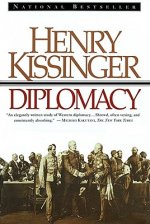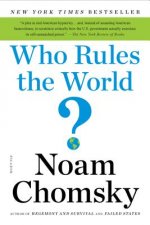
Kód: 04820726
Why Secret Intelligence Fails
Autor Michael A. Turner
Michael Turner argues that the root causes of failures in American intelligence can be found in the way it is organized and in the intelligence process itself. Intelligence that has gone awry affects national decision making and, ... celý popis
- Jazyk:
 Angličtina
Angličtina - Vazba: Pevná
- Počet stran: 224
Nakladatelství: Potomac Books Inc, 2005
- Více informací o knize

Mohlo by se vám také líbit
Darujte tuto knihu ještě dnes
- Objednejte knihu a zvolte Zaslat jako dárek.
- Obratem obdržíte darovací poukaz na knihu, který můžete ihned předat obdarovanému.
- Knihu zašleme na adresu obdarovaného, o nic se nestaráte.
Více informací o knize Why Secret Intelligence Fails
Nákupem získáte 63 bodů
 Anotace knihy
Anotace knihy
Michael Turner argues that the root causes of failures in American intelligence can be found in the way it is organized and in the intelligence process itself. Intelligence that has gone awry affects national decision making and, ultimately, American national security. Intelligence officials are reluctant to talk about intelligence successes, claiming "the secret of our success is the secret of our success." But these officials also shy away from talking about failures, largely because doing so would expose the failings of American intelligence and have an impact on policy consumers who may become more reluctant to accept and act on the intelligence they receive. Rather than focusing on case studies, the book takes a holistic approach, beginning with structural issues and all dysfunctions that emanate from them. Turner explores each step of the intelligence cycle - priority setting, intelligence collection, analysis, production, and dissemination - to identify the "inflection points" within each stage that contribute to intelligence failures. Finally, he examines a variety of plans that, if implemented, would reduce the likelihood of intelligence failures. While examining the causes of intelligence failures, Turner also explores intelligence as a critical governmental activity, making the book an excellent primer on secret intelligence. Turner writes in jargon-free prose for the informed reader interested in foreign policy and national security policy matters and brings enough depth to his subject that even experts will find this a must-read. Why did I write this book? I thought it was the right time to do so. Unfortunately, intelligence officials and policymakers often ignore, or at least downplay, intelligence failures. Yet, intelligence that goes awry affects national decisionmaking and, ultimately, American national security. Little is known about the causes of intelligence failures, in part because intelligence officials and their policy consumers are reluctant to talk about them. There is a saying in the United States intelligence community that the media and the public trumpet intelligence failures while ignoring intelligence successes. This would be true if the public knew as much about intelligence successes as it does about intelligence failures. However, the public does not know, largely because intelligence officials are reluctant to talk about intelligence successes, often claiming, "the secret of our success is the secret of our success." These people also shy away from talking about failures because doing so would expose the failings of American intelligence and have an impact on policy consumers who may become more reluctant to accept and act on the intelligence they receive. This, in turn, has consequences for the US intelligence community, whose legitimacy and funding depends, at least, on the appearance of making a difference in national decisionmaking. There is no doubt that intelligence provides benefits to national policymaking, and doing so efficiently requires coping with the problems associated with intelligence failures. Dealing with the phenomenon of intelligence failures, in turn, requires an understanding of their causes. This book is a modest try at filling this gap. I am fortunate to have been a practitioner of the craft of intelligence. I spent a big chunk of my adult life in intelligence, and I learned much about the intricacies of intelligence collection, analysis, production, and dissemination, to which the public rarely, if ever, is exposed. I also have had the privilege of studying the complexities of American intelligence as a scholar, an outsider. The two perspectives - of the insider and the outsider - have given me a complete picture of the workings of U.S. intelligence. What follows, then, is a distillation of many years of work and study. American intelligence is a vast, complex, and expensive enterprise, with tremendous strengths and distinctive flaws. This book focuses mainly on the flaws, in large measure because they are the harbingers of failure. Identifying the root causes, however, does not guarantee remedial actions or future success. The frustrating part in writing a book like this is having to conclude that there is really little that can be done about intelligence failures, because their root causes are firmly embedded in the intelligence process itself. Corrective actions can only serve to streamline the process. The best one can hope for is to minimize the chances of intelligence failures by employing America's considerable intelligence resources to collect timely and relevant intelligence information and for national leaders to employ that intelligence in the making of wise and sound policy.
 Parametry knihy
Parametry knihy
Zařazení knihy Knihy v angličtině Society & social sciences Politics & government International relations
633 Kč
- Plný název: Why Secret Intelligence Fails
- Autor: Michael A. Turner
- Jazyk:
 Angličtina
Angličtina - Vazba: Pevná
- Počet stran: 224
- EAN: 9781574888904
- ISBN: 1574888900
- ID: 04820726
- Nakladatelství: Potomac Books Inc
- Hmotnost: 490 g
- Rozměry: 230 × 150 × 24 mm
- Datum vydání: 31. January 2005
Oblíbené z jiného soudku
-

Prisoners of Geography
276 Kč -

World Order
316 Kč -

Grand Chessboard
561 Kč -

Clash of Civilizations and the Remaking of World Order
420 Kč -

Lords of the Desert
265 Kč -

Chaos in the Liberal Order
626 Kč -

Governing the World
357 Kč -

Understanding International Relations
1235 Kč -

Experts' Guide to International Protocol
1758 Kč -

Righteous Victims
511 Kč -

Diplomacy
473 Kč -

On Palestine
286 Kč -

Who Rules the World?
353 Kč -

Tragedy of Great Power Politics
551 Kč -

Image and Reality of the Israel-Palestine Conflict
733 Kč -

Tao Of Spycraft
1025 Kč -

Rethinking Fiscal Policy after the Crisis
4008 Kč -

Who Rules the World?
316 Kč -

Hundred-Year Marathon
389 Kč -

Legacy of Ashes
441 Kč -

Adults In The Room
358 Kč -

Cold War
462 Kč -

Planetary Cycles Mundane Astrology
481 Kč -

America's Secret War
433 Kč -

My Nationalist Pony
871 Kč -

PostCapitalism
306 Kč -

Drone Theory
249 Kč -

Geopolitics and Geoculture
770 Kč -

Romania and the European Union
969 Kč -

Human Rights and European Law
2588 Kč -

Diplomatic Theory from Machiavelli to Kissinger
5094 Kč -

Rise and Kill First
462 Kč -

The Spy and the Traitor
306 Kč -

PEACE TO END ALL PEACE
488 Kč -

Dead Aid
434 Kč -

Evolution of Cooperation
474 Kč -

World Order
358 Kč -

Countdown to Zero Day
384 Kč -

Political Order and Political Decay
420 Kč -

Strategic Vision
374 Kč -

Secret World
514 Kč -

Naked Diplomat
357 Kč -

After the Empire
396 Kč -

Understanding the Intelligence Cycle
1855 Kč -

Revenge of Geography
418 Kč -

Oxford IB Diploma Programme: Global Politics Course Book
1694 Kč -

Dawn of Eurasia
303 Kč -

Emergency Sex (And Other Desperate Measures)
410 Kč -

Diplomatic Protocol
952 Kč
Osobní odběr Praha, Brno a 12903 dalších
Copyright ©2008-24 nejlevnejsi-knihy.cz Všechna práva vyhrazenaSoukromíCookies




 Vrácení do měsíce
Vrácení do měsíce 571 999 099 (8-15.30h)
571 999 099 (8-15.30h)